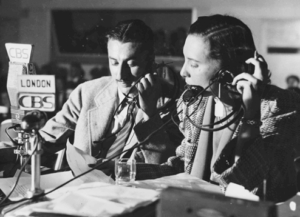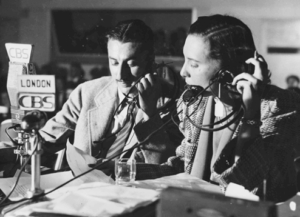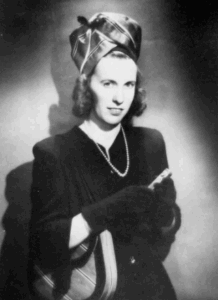Uncategorized
She claims she saw Hitler’s ashes and danced with Goering. But is any of it true?

Hitler and My Mother-in-Law
By Terese Svoboda
O/R Books, 416 pages, $23.00
Patricia Hartwell had many stories from her time as a correspondent for the US Office of War Information. Once, she said, she took a picture with Adolf Hitler’s ashes so American citizens would see that the war was over. It’s a thrilling tale, but nobody knows if it’s true.
The mystery surrounding this photo — where it is, if the ashes were actually Hitler’s, whether there even was a picture — takes center stage in Hitler and My Mother-in-Law, a lengthy memoir by author Terese Svoboda.

As a correspondent for the US Office of War Information during World War II, Hartwell was the first female reporter to arrive at Dachau and Hitler’s Eagle’s Nest. She also pocketed several of Hermann Goering’s medals. Well-researched, engaging, and occasionally cringe-inducing in its depiction of awkward interactions between Svoboda and Hartwell, the book paints Hartwell as a woman who was both morally dubious and undeniably impressive.
Svoboda, author of the novels Cannibal and Dog on Fire, has plenty of reasons not to believe her mother-in-law, who died in 1998 at age 82. She lied in an oral history of Hawaii’s State Foundation on Culture and the Arts about being accepted into Harvard Law School in 1936, even though women weren’t admitted there until 1950. She claimed several times to have been close friends with Eleanor Roosevelt and that she was invited to stay in the White House on occasion. No records of such a relationship with the former-First Lady exist.
While Svoboda doesn’t hold back her criticisms of her mother-in-law — and she has plenty — the memoir does not demonize her. Instead, Svoboda attempts to understand her mother-in-law’s penchant for embellishment in the context of the patriarchal society in which she lived, one that forced impressive women to be quiet about their achievements. Maybe struggling so long for recognition led Hartwell to feel the need to exaggerate her life story.
The book does not just explore the lies Hartwell told others but also the ones she told herself, such as refusing to believe that her second husband, Dickson Hartwell, a World War II veteran and fellow journalist, beat her children.

And yet among all the falsehoods, there are known facts about Hartwell’s life that seem stranger than the ones she invented. During the Allied occupation of Germany, Hartwell served briefly as the mayor of Berchtesgaden, a resort town where Hitler and other Nazi leaders vacationed. She got to see a collection of looted art recovered from Goering — and picked out a painting to take home. Apparently it wasn’t unusual for members of the American press and military to take souvenirs, no matter how heinous their origin story.
The piece, one of Lucas Cranach’s many versions of “Cupid Complaining to Venus,” was one of Hitler’s favorites. Nearly two decades after Hartwell brought it back to New York, Dickson sold the painting, apparently without her permission, to E. A. Silberman Galleries in order to purchase a small newspaper in Arizona. The Jewish-owned art firm then sold the painting to the National Gallery of London for over a hundred times more than what they bought it for.
Hartwell also claimed to have danced with Goering at a party that the American soldiers held the night of his arrest. According to some reports, rather than punishing Goering, the military fraternized with him. Based on her own archival research, Svoboda determines this claim to be plausible.
Why, Svoboda wonders, would Hartwell “want to boast of not only meeting the second most evil Nazi, but dancing with him?” If it’s a lie, it’s one that seems to work against its teller. If it’s the truth, it’s one most people would probably like to keep hidden. To some, whether it’s fiction or not may not be important. But Svoboda contends that to those who want to understand the type of person Hartwell was, the truth behind this story is crucial.
Although Svoboda remembers seeing the photo of Hartwell with Hitler’s ashes, it never resurfaced after the woman’s death. According to Svoboda’s husband, Hartwell’s oldest son, the ashes were not Hitler’s, just a random pile picked for a posed photo to mark the end of the war. No matter who — or what — the ashes belonged to, it’s the power behind the story, one of a fallen dictatorship, that mattered. And Hartwell clearly understood the power of stories.
The post She claims she saw Hitler’s ashes and danced with Goering. But is any of it true? appeared first on The Forward.
Uncategorized
EU-Funded NGO Backed Online Platform Targeting Jewish Businesses in Catalonia

Supporters of Hamas demonstrate outside the Israeli Embassy in Madrid, Oct. 18. Photo: Reuters/Guillermo Yllanes Gonzalez
The controversial online platform mapping Jewish-owned businesses, schools, and Israeli-linked companies in Catalonia, a region in northeastern Spain, was promoted by an EU-funded non-governmental organization.
On Tuesday, NGO Monitor — an independent Jerusalem-based research institute that tracks anti-Israel bias among nongovernmental organizations — released new information showing that Engineers Without Borders – Catalonia (ESF-C) and Universities with Palestine (UAP) jointly promoted the BarcelonaZ project on social media, identifying themselves as its primary backers.
First reported by the local Jewish outlet Enfoque Judío, the interactive map was launched by an unidentified group claiming to be “journalists, professors, and students” on the French-hosted mapping platform GoGoCarto.
As a publicly accessible and collaboratively created online platform, the map marked over 150 schools, Jewish-owned businesses — including kosher food shops — and Israeli-linked as well as Spanish and international companies operating in Israel, labeling them as “Zionist.”
“Our goal is to understand how Zionism operates and the forms it takes, with the intention of making visible and denouncing the impact of its investments in our territory,” the project’s website stated.
According to NGO Monitor’s newly released report, ESF-C is a European Union–funded NGO running a Youth Internship Program subsidized by the Public Employment Service of Catalonia, with 40 percent co-financing from the European Social Fund Plus — the EU’s primary program for funding employment, education, and social initiatives.
The EU Financial Transparency System shows that ESF‑C partnered on two EU grants worth about $2.8 million from 2019 to 2023 and received at least $164,000 in funding.
Jewish leaders in Spain have strongly denounced the BarcelonaZ initiative, warning that it fosters further discrimination and hatred against the community amid an increasingly hostile environment in which Jews and Israelis continue to be targeted.
“The mapping and boycotting of Jewish businesses in Catalonia is an echo of some of the darkest chapters in history, including the prelude to the Holocaust in Nazi Germany,” the Combat Antisemitism Movement’s Director of European Affairs, Shannon Seban, said in a statement.
“The organizers of this initiative put a target on the backs of Spanish Jews, at a time when Jews are being hunted across the globe, as seen so horrifically in Australia just three weeks ago,” she said, referring to the deadly attack on a Hanukkah celebration at Sydney’s Bondi Beach, which killed 15 people and wounded at least 40 others.
“Clear incitement to violence of this nature must not be platformed or tolerated by internet companies or government authorities,” Seban continued.
On its website, ESF-C describes its mission as promoting “a fair international society, which does not exclude anyone,” and highlights its commitment to “non-denominationalism and non-partisanship.” Yet, the NGO’s 2024 annual report also asserts that it “cannot ignore the Palestinian resistance, a clear expression of the struggle for freedom of all oppressed peoples.”
In a social media post, the NGO also accused Israel of “genocide” during its defensive campaign against the Palestinian terrorist group Hamas, describing its platform as “a resource designed to inform, raise awareness, and mobilize the educational and student community in Catalonia.”
“The attacks that began on Oct. 7 have involved water and electricity cuts, the boycott of essential water infrastructure, and the contamination of Palestinian water sources,” ESF-C wrote in an Instagram post, without mentioning the Hamas-led invasion of and massacre across southern Israel on Oct. 7, 2023, which triggered the war in Gaza.
“The violation of these basic rights is a key weapon used by the State of Israel to perpetuate genocide,” the statement read.
NGO Monitor also revealed that UAP is a network of Catalan faculty- and student-led anti-Israel organizations that co-sponsored the BarcelonaZ project.
Last year, UAP organized a “People’s Court” at Complutense University of Madrid on what it called the “Palestinian genocide,” with attendance from several terror-linked NGOs and individuals, including Samidoun, Masar Badil, Al-Haq, and Raji Sourani, NGO Monitor reported.
Several community organizations have filed complaints with GoGoCarto, demanding the site’s removal and arguing that it violates French laws against hate speech and discrimination.
Earlier this week, GoGoCarto announced it had removed the BarcelonaZ project from its website after local groups denounced the initiative as blatantly antisemitic and dangerous.
Uncategorized
Knesset member from Netanyahu’s party decries ‘new enemy’: Tucker Carlson and Candace Owens
(JTA) — In an address to the Knesset on Monday, Likud lawmaker Dan Illouz decried what he said was a “new enemy” rising within American politics: Tucker Carlson and Candace Owens.
“We are used to enemies from outside. We fight terror tunnels of Hamas. We fight the ballistic missiles of Iran. But today I look at the West, our greatest ally, and I see a new enemy rising from within,” said Illouz, who is originally from Canada originally, in an English address. “I am speaking of a poison being sold to the American people as patriotism. I’m speaking of the intellectual vandalism of Tucker Carlson and Candace Owens.”
Illouz’s comments come as the Republican party has been roiled in recent months by debates over the mainstreaming of antisemitic influencers within the GOP.
טאקר קרלסון וקנדיס אוונס הם לא פטריוטים – הם ונדלים אינטלקטואלים. הם טוענים שהם נלחמים בשמאל הקיצוני, אבל הם בדיוק אותו דבר: אותה שנאה למערב, אותו רלטיביזם מוסרי ואותו ניסיון להחריב את המורשת שלנו ואת המערב. pic.twitter.com/ygN70WtGEw
— דן אילוז – Dan Illouz (@dillouz) January 7, 2026
In October, conservative commentator Tucker Carlson hosted far-right antisemitic influencer Nick Fuentes on his platform, igniting outrage from Jewish conservatives who warned of the growing reach of antisemitic voices.
Owens has long made antisemitic rhetoric a hallmark of her YouTube channel, which has 5.7 million subscribers. A recent analysis of her content by the Jewish People Policy Institute found that three-quarters of her videos that mentioned Jews were antisemitic.
“They claim to fight the woke left. They are no different than the woke left,” said Illouz. “The radical left tears down the statues of Thomas Jefferson, Tucker Carlson tears down the legacy of Winston Churchill. The radical left says Western civilization is evil, Candace Owens says the roots of our faith are demonic. It is the same sickness.”
Carlson and Owens are among the right-wing influencers who have made opposition to Israel a centerpiece of their output, at a time when support for Israel is declining among conservatives, particularly younger conservatives.
In November, Amichai Chikli, the Israeli Diaspora minister, echoed Illouz’s concerns in an interview with the New York Post, telling the outlet that he was “far more concerned about antisemitism on the right than on the left.” The comments were notable because Chikli is himself a right-wing, anti-“woke” warrior who, in a first for Israel, has stoked relationships with far-right European parties that in some cases have ties to the Nazis.
“One of the worst moments was when a popular conservative broadcaster called one of the most vile Holocaust deniers in America ‘one of the most honest historians.’ That legitimizes hate — it normalizes it,” Chikli told the New York Post, appearing to refer to Carlson’s past praise of the Holocaust revisionist Darryl Cooper.
Chikli also warned against the rising influence of Fuentes and Cooper among young Americans.
“Antisemitism has become fashionable for Gen Z,” Chikli continued. “They listen to podcasts, not professors. When people like Nick Fuentes or Darryl Cooper are treated as thought leaders, that’s dangerous. These are neo-Nazis.”
The Times of Israel asked Illouz whether he was worried about appearing to interfere with American politics. “Defending the alliance between America and Israel is not interfering,” he said. “I am in touch with many pro-Israel conservatives who know that Candace and Tucker are a threat to America as much as to Israel.”
Top GOP officials, including Vice President JD Vance, have largely dismissed calls from Jewish conservatives, including Ben Shapiro, and others to draw a line against antisemitic influencers.
“Do you think you are the first to try to delegitimize the Jewish people? We are the people of eternity,” said Illouz toward the conclusion of his address, adding that “we will be here long after your YouTube channels are forgotten dust.”
The post Knesset member from Netanyahu’s party decries ‘new enemy’: Tucker Carlson and Candace Owens appeared first on The Forward.
Uncategorized
Texas Joins Legal Action Against American Muslims for Palestine as Move to ‘Counter Hamas Terrorism’

Texas Attorney General Ken Paxton speaks during AmericaFest, the first Turning Point USA summit since the death of Charlie Kirk, in Phoenix, Arizona, US, Dec. 20, 2025. Photo: REUTERS/Cheney Orr
Texas Attorney General Ken Paxton on Tuesday announced the state would join Virginia and Iowa in the filing of a legal brief against the nonprofit activist group American Muslims for Palestine (AMP) and other organizations which he characterized as “radical” in order “to combat Hamas terrorism.”
“Radical Islamic terrorist groups like Hamas must be decimated and dismantled, and that includes their domestic supporting branches,” Paxton posted on the social media platform X.
“Terrorism relies on complex networks and intermediaries, and the law must be enforced against those who knowingly provide material support,” Texas’s top legal officer added in a statement. “My office will continue to defend Americans who have been brutally affected by terrorism and ensure accountability under the law.”
In November, Texas began more aggressive legal efforts against organizations long alleged by researchers and law enforcement to be part of a domestic Hamas support network in the United States. Gov. Greg Abbott announced on Nov. 18, the designation of the Muslim Brotherhood and the Council on American-Islamic Relations (CAIR) as terrorist organizations.
A month later, Paxton filed a motion defending the designation in court, countering a suit by the Dallas-Fort Worth and Austin chapters of CAIR. “My office will continue to defend the governor’s lawful, accurate declaration that CAIR is an FTO [foreign terrorist organization], as well as Texas’s right to protect itself from organizations with documented ties to foreign extremist movements,” Paxton said at the time.
In its latest statement, Paxton’s office described how on Oct. 8, 2023, one day after Hamas’s invasion of and massacre across southern Israel, the groups AMP and National Students for Justice in Palestine (NSJP) “declared that they were ‘part of’ a ‘Unity Intifada’ under Hamas’s ‘unified command.’”
“Those who have been victimized by Hamas’s terrorism brought claims against the radical groups under the federal Anti-Terrorism Act,” the statement continued. “Attorney General Paxton’s brief is in support of the victims and was filed to ensure terrorist supporters are brought to justice.”
The legal brief references the “unity intifada” and “unified command” sentiments before stating, “They should be taken at their word. And just like their predecessor organizations — convicted or admitted material supporters of Hamas — they should be held accountable.”
The brief charges, “Defendants here are alleged to have provided material support for Hamas, the brutal terrorist regime that not only oppresses millions in Gaza but that also murdered more than a thousand innocents and kidnapped hundreds more. States have an interest in ensuring that valid claims brought under material support statutes are allowed to be litigated in court and that any violators are held accountable.”
Last year, Virginia’s Attorney General Jason Miyares — whose name appears at the lead of the brief — sought to press AMP to reveal its funding sources, which a judge ruled it needed to do May 9, 2025.
The latest brief provides a history lesson about how AMP and NSJP “did not begin their material support for Hamas on Oct. 8, 2023; rather, their material support has been going on for decades — both as the current organizations and through predecessor entities. Indeed, AMP was founded after a predecessor organization and five of its board members were convicted of providing material support for Hamas.” The brief describes the network beginning when “first, the Muslim Brotherhood founded the ‘Palestine Committee’ in 1988 to fund the terrorist organization Hamas.”
This network included “several organizations providing Hamas financial, informational, and political support,” the legal document explained. “Among those organizations were the Holy Land Foundation for Relief and Development and the Islamic Association for Palestine (IAP), organizations founded and controlled by senior members of Hamas leadership.”

